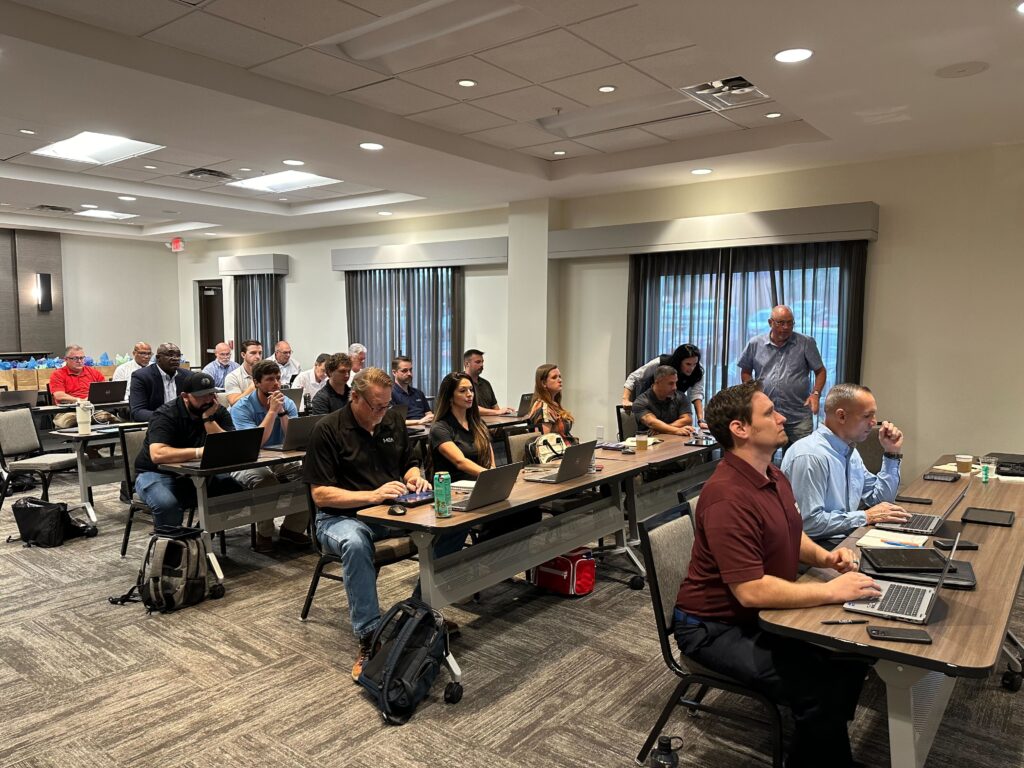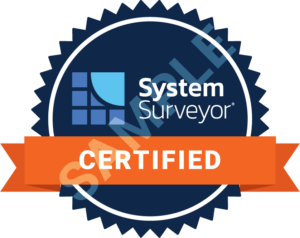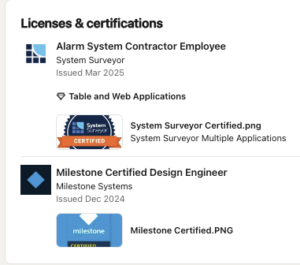2025 is a year full of opportunities for system integrators — the physical security and low voltage market continues to grow at a significant pace (8.7% CAGR during this decade, projected to reach $211 billion by 2030). This growth means more sales opportunities, but those opportunities come at a cost. As the physical security industry modernizes and consolidates, competition is getting more intense — even as talent remains hard to find and keep.
Security System News found in a recent survey that over 41% of surveyed system integrators call out recruitment and retention of skilled labor as a top challenge. Other top-of-mind concerns include rising costs (both equipment and installation) and cybersecurity responsiveness and adaptability.
It’s more important than ever before to gain a competitive edge so you can continue to set yourself apart and stand out from the crowd. One of the best ways to do this is through upskilling. Not only does upskilling deliver a competitive edge, it also helps you solve skilled labor challenges organically, with fewer new hires.



What Does Upskilling Look Like for System Integrators?
Upskilling in general means expanding your and your workforce’s skill set by acquiring new technical, business, and problem-solving skills. But what does this look like for system integrators?
In our industry, upskilling means gaining new abilities to consultatively design, implement, and maintain integrated systems, leveraging new digital tools for collaborative physical security system design. Upskilling could also involve learning about emerging technologies, earning industry certifications, improving project management capabilities, or mastering cybersecurity practices.
5 Simple Ways System Integrators Can Upskill to Excellence
Upskilling can take quite a few different forms: it all depends on what your business needs to get that competitive edge. The skills and experience you already have, the skill gaps or areas of weakness you already know about, and the parts of the physical security market you want to expand into can all influence what kinds of upskilling to pursue.
To get you started, we’re highlighting five key areas where system integrators can start upskilling today.
1. Mastering Emerging Technologies
It’s an exciting time in physical security with numerous emerging technologies promising to reshape the way we approach keeping both spaces and people safe.
Yet rapid technology changes can cause problems for system integrators, who must master elements of emerging technologies before they can incorporate them into security system designs seamlessly and naturally. Artificial intelligence (AI) promises to reshape the physical security landscape, yet it’s difficult to sort through what’s genuinely useful today and what’s likely coming tomorrow.
There’s also the Internet of Things (IoT), a vast array of connected smart devices that interact with and sometimes control physical security systems. There is cloud and hybrid-cloud solutions to understand.
Some physical security integrators are expanding into A/V or into IT managed services, as well (and vice-versa: firms that used to specialize in one of those disciplines are expanding into the other and into physical security).
Whichever of these categories you’re active in (or plan to expand into), staying up to date on the emerging technology in those categories is one of the keys to being able to offer cutting-edge solutions that take advantage of new tech and meet evolving customer needs.
2. Learning Advanced Networking & Cloud Integration
Whether you plan to expand into IT services or not, physical security itself is getting more technologically advanced, relying on advanced networking setups and cloud integration to perform well.
What that means for integrators: Basic networking skills and just enough knowledge to set up local storage won’t cut it anymore.
To get ahead, your team needs to understand hybrid cloud solutions designed for streamlined operations and better collaboration. Upskilling in these areas allows integrators to create more scalable and efficient systems and to start using collaborative cloud-based solutions in their work.
3. Obtaining Industry Certifications
Many industry organizations and vendors now offer certifications that can both strengthen your skill sets and boost your credibility with prospective customers.
Look for certifications from manufacturers, software providers (like System Surveyor), and industry organizations and associations, then pursue the ones that offer the right balance of practical training and credibility for your unique situation.

System Surveyor’s new certification program is an exciting option for current and new System Surveyor users. Our 100% free, 24 x 7 video-based certification course helps system integrators understand how to get the most out of System Surveyor. Our certification course helps users master the art of creating site surveys, collaborative system designs, digital as-builts, and even automated bill of materials.
The System Surveyor certification also communicates to customers that you’re serious about visual, digital collaboration. As System Surveyor grows in adoption and reputation, this certification becomes a selling point and a mark of credibility and trust.
Learn more about our new certification program. (You must be a registered user to participate in the Certification Program. Start your free account.)
4. Standardizing the Sales Process
If you’ve been in system integration for a long time, you’d probably agree that in terms of the sales and design process there is no status quo!
Oftentimes, sales, ops and engineers follow their own unique processes. They do what works for them, and that works to a degree — until it doesn’t. This approach makes onboarding a new hire extremely time-consuming and can create a frustrating environment for that new hire: which process is the one to follow? No one can say!
Another piece of the upskilling puzzle is fixing the sales-process status quo. Standardizing your sales process following a structured, digital-first, automation-friendly approach to the site survey helps your business create consistent, professional customer interactions — every single time. Standardization also simplifies the onboarding process, reducing time to value for your new hires and inexperienced staff.
Traditional paper-based floor plans and written notes result in a site survey process that is slow, uninspiring, and prone to errors. Details get lost in transit, and no one can fully picture what a system design is going to look like until after installation.
System Surveyor allows integrators to digitize and modernize the site survey process, making it faster, more collaborative, more professional and more efficient. Improved accuracy and reduced rework ensure that decision-ready proposals match actual site conditions and make for a seamless handoff to operations and installation.
In other words, a standardized process ensures that all sales representatives and engineers follow the same workflow when assessing customer needs and designing systems. This leads to uniform proposals and designs, minimizing discrepancies and confusion. Customers take notice too!
5. Specializing in Niche Markets
It’s certainly possible to build a successful system integration business as an “industry generalist”: there are plenty of relatively similar buildings and campuses out there that need video surveillance systems and access control systems. Many office and retail developments don’t require anything all that specialized.
But generalists may find themselves missing out on projects and clients looking for more specific knowledge and experience. These are often larger projects in specialized industries and represent an opportunity for differentiation — and premium pricing.
As competition increases and technology evolves, the pool of prospective clients who will be satisfied with generalist-level service may shrink.
So, our final upskilling tip is specialization: gain experience, certification, and industry knowledge in specific high-value industries that need more than general-market support. A few examples include healthcare, industrial automation, and smart buildings (which span numerous industries and uses). By diving deeper into specific niches, you may unlock new business opportunities and new avenues for growth.
Upskill Your Team: Gain a System Surveyor Certification

Standing out in a competitive and increasingly complex market is the key to capturing more of the growing physical security market. Truly thriving in today’s security industry requires modernizing your approach to system design, rethinking your sales workflows and customer relationships, and yes, upskilling your workforce.
We’ve given you five powerful ways to upskill, including:
- Master emerging technologies
- Learn advanced networking and cloud integration
- Obtain relevant industry certifications
- Standardize your sales process
- Find your niche and specialize
System Surveyor’s industry-changing software helps you on several of these fronts, enabling you to standardize your sales and design processes around collaborative digital system designs that reflect real-world conditions, like showing to-scale area of coverage on dimension-accurate floor plans. Customers and sales team members can collaborate in the same cloud-based System Surveyor file, creating greater buy-in and helping to sort out problems or miscommunications early on — before parts are ordered and trucks roll.
And now, System Surveyor is supporting its users in a new way, with a 100% free digital certification program. This practical program teaches System Surveyor users best practices that they can use to create designs — and close sales — faster, with more accuracy than ever before. And our certification tells your clients and prospects that you’re staying on the leading edge of what’s possible in physical security system design.
Ready to learn more? Start a free trial today.

Maureen Carlson is co-founder and president of System Surveyor, the leading digital platform for physical-security site surveys and system design. With 25 + years in B2B SaaS and security technology, she leads the go-to-market and operations with a top notch team. Under her leadership, System Surveyor has grown into an industry-defining software used worldwide to streamline system design, enable collaboration, and raise the bar for security and technology professionals. Maureen enjoys building relationships in the industry and user community to build sustainable, high growth business. In her spare time in beautiful Austin, you’ll find her spending time outdoors, on a tennis court, reading or with family and friends.
